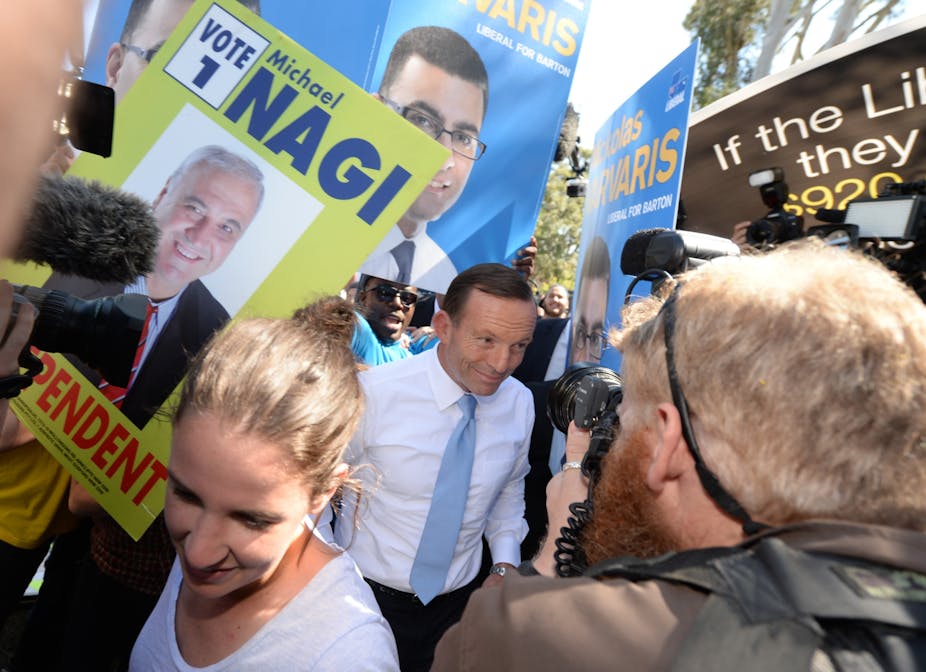Tony Abbott and Kevin Rudd knew what to expect yesterday - with one exception. Both candidates were savagely heckled at polling stations. This morning Abbott is smiling about victory. He should be pondering the power of television: the medium that told the world that lots of people don’t like him.
It’s not that surprising. This election demonstrated time and again that the alliance of television and ordinary people can upset the best laid plans.
As pundits moved into wrap-up mode yesterday, former Rudd adviser Lachlan Harris surmised on Channel Nine that Campaign 2013 never happened. Both candidates quickly realised that, where they might be able to score points off each other, neither had the chops to tame live TV.
The folks over on Channel 10’s The Project agreed. With the result never in doubt, Saturday’s special edition analysed the top media campaign gaffes. There wasn’t a terrible tweet, Facebook faux pas or memorable meme in sight. But plenty of TV bloopers. Starring role went to the Coalition’s Julie Bishop and her prodigious talent for spruiking her boss via inadvertently hilarious double entendres.
Perhaps this is why Abbott and Rudd agreed to politics-lite finales on ABC’s Kitchen Cabinet, where they discussed what types of blokes they were while barbecuing and baking brownies. But all to no avail. At curtain call, Abbott’s landslide delivered live coverage of a hasty retreat from Arncliffe in the face of a hostile crowd. The images said that new prime minister is preferred but not popular. This isn’t a good look in the age of entertaining personality politics.
Much about yesterday doesn’t make sense, because the television story didn’t match events in voting booths. Today, when global television audiences think about Australia, they may well focus on the thoughts of a senior voter who spoke from Arncliffe on Sky News. Surveying the chaotic scene, her conclusion was succinct: “bloody bastards”. No keeping hope alive here. No “things can only get better”.
Then there was the confusion of Rudd’s concession speech that looked more like a victory party. This was a clever stunt, because history tells us that compelling visuals often win out over sober political analysis.
As Sky News’ Peter van Onselen reminded viewers that Labor had suffered a significant body blow - no matter how Rudd was spinning things - he must have known that the scenes behind him will be remembered longer than his commentary.

As politicians, journalists and scholars compete to determine the significance of campaign 2013, they will have to contend with television’s power to define historical memory. Writing history is never easy. Writing media history is harder still, especially when the big eye of the small screen is around.
Good historians know that facts have to be interpreted. We might have an impressive array of big data tools that produce dazzlingly sophisticated explanations for voting behaviour, but being able to predict how people will behave doesn’t tell us about their motives.
And knowing what people think is not the same thing as understanding how they feel. The symbols that cultures produce in times of change give vital clues about the public mood during landmark historical moments, but their meaning takes a long time to fathom.
Nevertheless, it matters that most of the things that have kept us talking have happened on television. Television still delivers “must-see” moments, and anyone analysing the role of other media has to bear this in mind.
Because beneath the apparent “chaos” of modern media politics - where an octogenarian voter can upstage an incoming prime minister - deep centralising forces are at play. Much of this is about Murdoch. But more of it is about mediatisation.
Mediatisation expresses the idea that political life is governed by what works for media. Nothing better summarises that than television. On one level, television didn’t work for anyone yesterday: Tony Abbott, Kevin Rudd, Peter van Onselen or The Project crew who desperately fought to keep interest alive in a contest that was already over.
Ultimately, this campaign will fade from popular memory, because it was contested between opponents who didn’t entertain or engage us in our living rooms.
Which is precisely why television is the winner, yet again. Tony Abbott looked unpopular yesterday because of TV’s popularity. It decides how trust is won and lost through conflict and compelling visuals - whoever the candidate, whatever their beliefs, and notwithstanding the particular proclivities of media moguls.
The predictable unpredictability of live television remains a powerful draw, and will probably determine who we dislike in 2016. Politics is unpopular because TV has taught us to want it that way.

